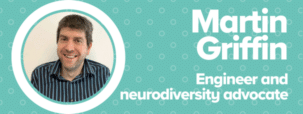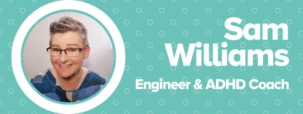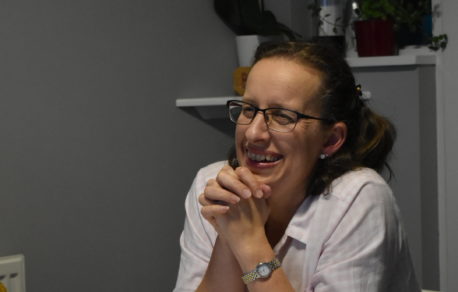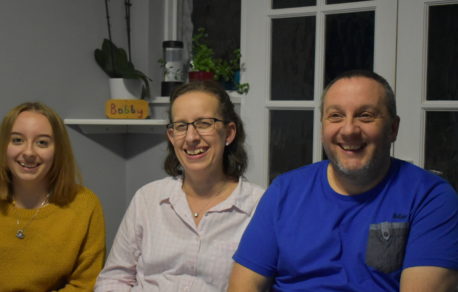
A life in two halves – living with a disability
On this year’s Day of People With Disabilities, we’re hearing from Richard Farrar. An electronic engineer, Richard had a life-changing accident 20 years ago. In his blog, he tells his story of coming to terms with his new life, and talks about people and technology that make his life easier.
Life can change in the blink of an eye – literally! One minute you’re on top of the world, the next your entire world comes crashing down around you. One summer’s evening in 2000 I dived into my next-door neighbour’s swimming pool, misjudged the dive, and hit the bottom. The accident left me paralysed from the neck down. I spent months on a ventilator in intensive care and a total of nine months in hospital, so much so that I became institutionalised.
Hospital became my safe place and the proposition of coming home was terrifying. This was partly because the backup of the nursing team (my security blanket) would disappear. And also because I could not accept that I wouldn’t get better. I was in a state of denial that eventually morphed into a sustained period of grieving for my former life/self. This process wasn’t measured in days, weeks or even months, but rather years.
Coming home
The logistical planning involved to get me home was substantial. A care team had to be put in place comprising care agency staff and district nurses. Plus all of associated disability paraphernalia and physical modifications to my house, to make it a little less disability unfriendly.
All of this completely passed me by, while others took up the strain. I remember being consulted about the process, but I wasn’t in any fit mental state to contribute meaningfully. In fact, because of my abject denial, I was probably more of a hindrance.
Those were dark days for me, and undoubtedly tough on everyone around me, but I obviously completely oblivious to that fact. I was morose, and by all accounts, pretty uncommunicative. In situations like those when someone tells you to ‘pull yourself together’, that’s the last thing you want to hear (no matter how well meant) and not the least bit helpful.
In fact, I never did ‘pull myself together’. That implies some sort of realisation of the situation, and consequent action. But I’m no longer that broken, empty shell of a person thankfully. The process was slow, one might even say glacial. But I am me again – the old me, but just a little bit different. In fact, I don’t really think of myself as disabled, despite the glaringly obvious fact that I’m paralysed from the neck down and need assistance with pretty much every aspect of my life.
A new life
Not long after the accident, my marriage broke down and I had to sell my family home. The combination of my wife leaving me, coupled with the thought of having to leave the family home from my ’previous life’ and a wonderful little village with so many good friends was immensely traumatic for me.
The funds I had weren’t enough to buy anywhere else at the time, and I had no chance of getting a mortgage. Foothold helped me with a loan to purchase a bungalow, which relieved me of a huge burden, both mentally and financially. Foothold was a constant source of help and support throughout that difficult period of my life, especially via their local area representative at the time Malcolm, who became a good friend, together with Caroline at head office. Malcom helped fill in all my benefits forms, arranged the house loan with Caroline and generally greased all the wheels that required greasing and just made things happen. He was always there anytime I needed him. It’s impossible to overstate how much this helped me financially and in so many other ways too.
Getting the right support
With the help of a very friendly Occupational Therapist, Emma, my bungalow was adapted for my specific needs. It was perhaps the first step in my metamorphosis. I was no longer living in just two rooms but had a home that worked for me and yet wasn’t overtly ’a disabled person’s home’. I’m sure this must have subliminally assisted in my mental recovery.
At the same time, I needed 24-hour care support that was provided by an agency and arranged by the council on my behalf. I didn’t particularly want a carer and had no idea what life would be like with a stranger in my home 24/7, but it was inevitable. Initially I would rely on my friends for trips out instead of the carer. This was my coping strategy for an alien situation and a stepping stone to ease the disjointed transition in my life yet again.
The second carer I had was a South African lady named Sue. At the time I had absolutely no idea how much this person would transform my life. Sue came to the UK for six months to work in caring. Eighteen years later she’s still here! Sue is an unstoppable force of nature. She’s so full of life that you can’t but help to absorb some of that energy by osmosis.
Putting myself back together
I was in a broken state at that time. But, bit by bit, Sue helped to put Humpty Dumpty back together again. It certainly didn’t happen overnight and required a copious amount of glue. I slowly emerged from the gloom and began to reconnect and socialise with my long-suffering friends. Some had fallen by the wayside, but I’m eternally grateful for those that persevered with me.
With Sue’s help and encouragement, and a willingness to tackle most things, I’ve achieved more than I ever thought would be possible. I’ve travelled to places in the UK and abroad that were beyond my wildest dreams. I even got to the Pyramids at Giza – one of my bucket list items.
If you’re lucky enough, having the consistency of a constant carer is a huge solace, especially someone like Sue. But consistency in the whole care team is important too and adds so much to your emotional wellbeing.
Both Sue and I are sociable creatures. So, my extended group of friends (who have inevitably become Sue’s friends too) continue be hugely important in my life. And it’s in times like these that you fully appreciate the significance of your social circle when it’s no longer available.
Foothold, who were so transformative in the early stages of my ‘new’ life, continue to support me in many ways. The financial support for my daily living, and those unexpected costs we all experience from time to time, means I don’t have to exist, but live. And I do – a rich and fulfilled life (2020 excepted for obvious reasons).
Using equipment and technology
I am an electronic engineer by trade, so I can’t fight the urge to tinker (with assistance) and have an inevitable penchant for gadgets. I have a head-mouse attached to my computer and I use a virtual onscreen keyboard to type. With these two aids I can do most things that I used to be able to do on my computer before my accident. This gives me a window on the world and allows me to be able to manage most of my affairs online. Most importantly, it provides me with intellectual stimulation.
If I’d been born a few decades earlier, things would have been very different. I’ve helped several friends with websites and hobby electronic projects – something I never thought I’d be able to do again.
For many years there was talk of the smart home. I believe the technology to make it possible has existed for years. But it’s only relatively recently that it’s truly become a reality and at an affordable cost. Technology has finally caught up and my inner nerd has been unleashed! I now have five Alexas in the house that I can use as an intercom. I can call Sue if I need assistance, even if she’s out running errands. I now have:
- a host of smart plugs and lights
- a smart thermostat
- smart doorbell
- a device that can control my TV and amplifier, all controlled by my voice.
Technology has had a massive impact on my life by assisting my disability and I’m sure will continue to do so. Unfortunately, I don’t have a Jarvis, like Ironman, that can pour me a beer, but thankfully I do have a Sue. No amount of technology will ever eclipse that need for the so essential human element of emotional support (and perhaps the occasional beer).
My life has been in two chapters with a significant discontinuity in between, although it is still very much a life and not an existence. But it’s only been made possible with a huge range of help and support across the board and from all different angles.



